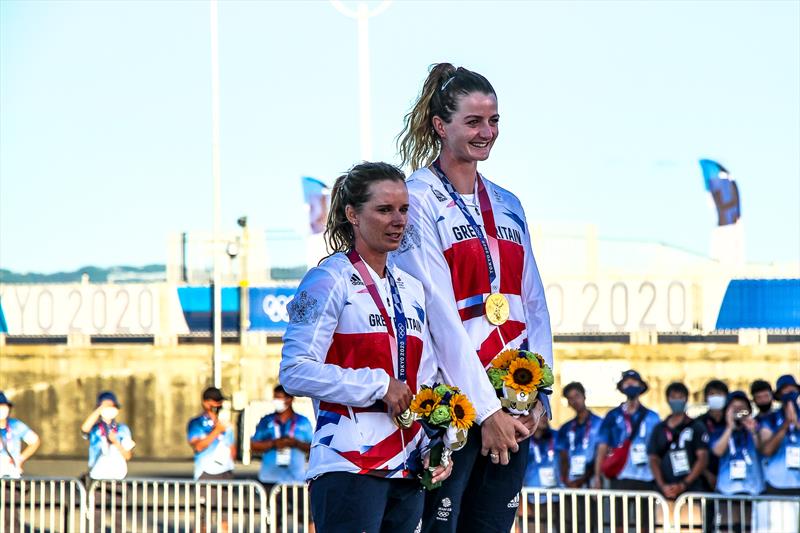
Road to Gold - Growing champions..the changing face of sailing..end of the Olympic superpowers?
by Richard Gladwell/Sail-World.com/nz 25 Dec 2022 17:02 PST
26 December 2022

Olympic classes have become increasing physique specific - Hannah Mills and Eilidh McIntyre (GBR) - 470 Womens Medal CeremonyTokyo2020 - Day 10 - August 4, 2021, Enoshima, Japan © Richard Gladwell - Sail-World.com
It was interesting to listen to the latest series in Road to Gold, the excellent online sailing program aimed at everyone who likes, follows or participates in sailing at all levels, from the Green fleet to full-time professional racers.
Road to Gold is convened by top Olympic coach and triple world 470 champion Hamish Willcox and a leading international sailing journalist Andy Rice.
Last Wednesday's edition featured Ian Walker, a double Olympic medalist, Volvo Ocean Race-winning skipper and along with a host of other titles and achievements. He recently left the Royal Yachting Association as Director of Racing and oversaw the British Olympic program for Tokyo 2020. He is now the general manager of North Sails UK.
The topic was "construction of a great sailor, Youth training and the pathway to Olympic greatness."
A lot was packed into just 60 minutes as the three shared various experiences - Ian Walker from an Olympic perspective, as a sailor and then as a leading coach/director. Andy has a long experience in UK dinghy classes and what happens at club, national and international levels. Hamish came up through the NZ club system in the 1970s and 1980s and sailed in what was a very competitive 470 class at a club and national level.
Ian made several interesting points, the first of which is that the British Olympic results of the past two decades are probably not sustainable - for several reasons.
Firstly there are not enough people coming through of the standard required. By his calculation, to be sustainable, the UK program needs to pick up one top future Olympic medal winner each year from the RYA Youth programs/pathways. That is a walking, breathing sailor who can deliver results and can be coached, not someone who is just long on potential. Of course, the hope of the Chosen One is that the Olympic classes stay the same by the time the future medalist gets to the top of the game.
Second, the Olympic classes are now such that only two, the ILCA6 and ILCA 7, are sailed at club level in the UK. Walker would not rate the 49er/FX as a club boat, as they are so technically challenging. The same comment applies to the Nacra 17. Windfoilers are yet to be accepted as a club class, primarily because the foiling board sailors, as they have done for the past 40 years, don't see the point of joining a yacht club. All they need is a lake bank, beach or ramp to launch and exit when they return, and they bypass any need for club system and support.
Third, the physiques required of the sailors now are so specific by class that it is only possible to get to the top of the Olympic apex with some dedicated physical training. However, no matter how much they love sailing in a particular class, a short person can't suddenly become tall. Being a physical match with your chosen Olympic class is now a prerequisite. That cuts out a lot of potential sailors, as they exit their youth sailing years.
Fourth, the cost of the sport has got prohibitive even at a junior level, which may compound over the next year or two due to looming economic downturns. All three panellists came through an era where coaching was relatively unknown, and they improved by working as part of a crew or chatting amongst themselves in single-handed classes after a race. Not raised was the statistic that now, contrary to their era, 50% of junior sailors come from non-sailing families, while previously, the sailing bug was passed between generations of the same family.
In the same vein, many top sailors joined the sport in their late teens or early 20s but got through with a very dedicated approach.
Ian Walker mentioned that he used to keep a sailing log and to his surprise, he found that he sailed 180 races per year. That was in the days when you sailed one race per day, not four in an afternoon. He dropped in the thought that 200 days of sailing a year was becoming standard amongst those wanting to make an Olympic squad.
It was also noted that many top sailors are totally compliant within the rigour of a coaching and talent development program, but many of the truly successful sailors had a rebel streak. In fact it was almost an essential personality trait. Walker and his long-time partner, the late John Merricks, had it, as did Ben Ainslie and Iain Percy, to name but a few in the British camp.
Although the point wasn't mentioned, if you stripped the Olympics out of the equation, the picture becomes quite different - particularly when the approach revolves around having fun, loving the sport before you get serious about it, and finding lower-cost ways of participation.
Many clubs in New Zealand and elsewhere in the world have recognised this - with the promotion of various schemes and programs - which is where the RS range of boats is targeted, and later on, the International classes (non-Olympic) and programs like The RNZYS youth scheme.
The last three years of the pandemic restrictions have changed the sporting landscape. It requires a lot of new thinking and promotion of sailing to recover the lost ground.
For more on Road to Gold and how it can improve your sailing performance and enjoyment www.roadtogold.net or catch some of the interviews with guests on Facebook www.facebook.com/SailRoadToGold